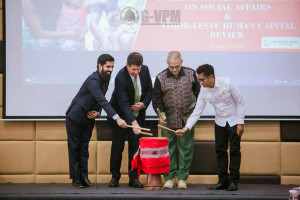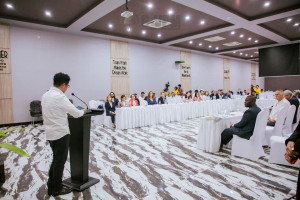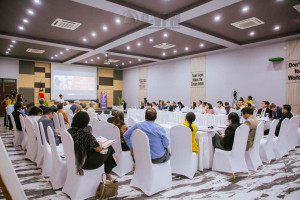On November 14th, 2023, the Vice-Prime Minister and Coordinating Minister for Social Affairs, Mariano Assanami Sabino, announced the establishment of an Interministerial Task Force for Social Affairs and Human Capital Review. 
The official launch took place at City 8 in Dili. It was attended by the Ministers of Education, Health, Social Solidarity and Inclusion, National Liberation Combatants Affairs, Higher Education, Science and Culture, Youth, Sport, Arts and Culture, Agriculture, Livestock, Fisheries and Forestry, as well as the Secretary of State for Equality and Inclusion. Strategic development partners, including UNICEF, the World Bank, UNDP, UNFPA, FAO, WFP, WHO, IFP, ADB, DFAT, the European Union and ILO also attended the event.
This Task Force’s main objective is to support sustainable development through a coordinated approach, investing in human capital. 
In his speech during the ceremony, the Vice Prime Minister thanked the relevant ministries and strategic partners for their commitment to the Task Force’s objectives.
The Vice Prime Minister explained that “the focus of the Task Force will be on early childhood development, improving nutrition and food security, and youth empowerment.
Regarding early childhood, the importance of the first years of life for overall growth and future success was emphasised. As for nutrition and food security, it was emphasised that adequate nutrition is essential for citizens’ growth, development and health. 
The Vice Prime Minister expressed concern about the prevalence of malnutrition in Timor-Leste and its severe consequences for physical and cognitive development.
Regarding youth empowerment, it was emphasised that investing in the potential of young people is crucial for the progress and development of the nation. Empowerment aims to provide knowledge, skills, resources and opportunities for young people to actively participate in society and contribute positively to the community.
These three cross-cutting priorities require strong coordination between the Government and its partners, which will be vital to overcome institutional obstacles, avoid duplication, ensure the efficient implementation of policies and programmes, allocate resources effectively, promote accountability and foster a culture of communication, cooperation and collaboration.